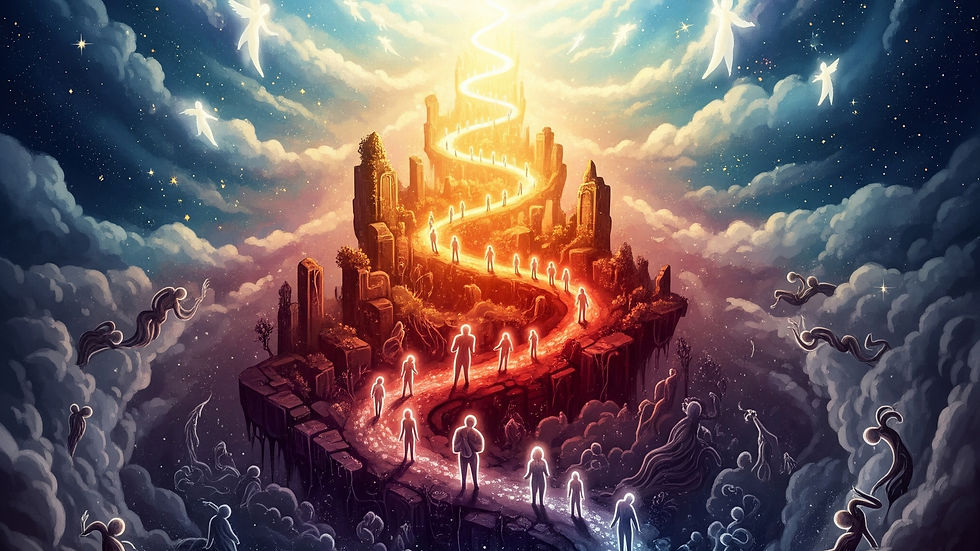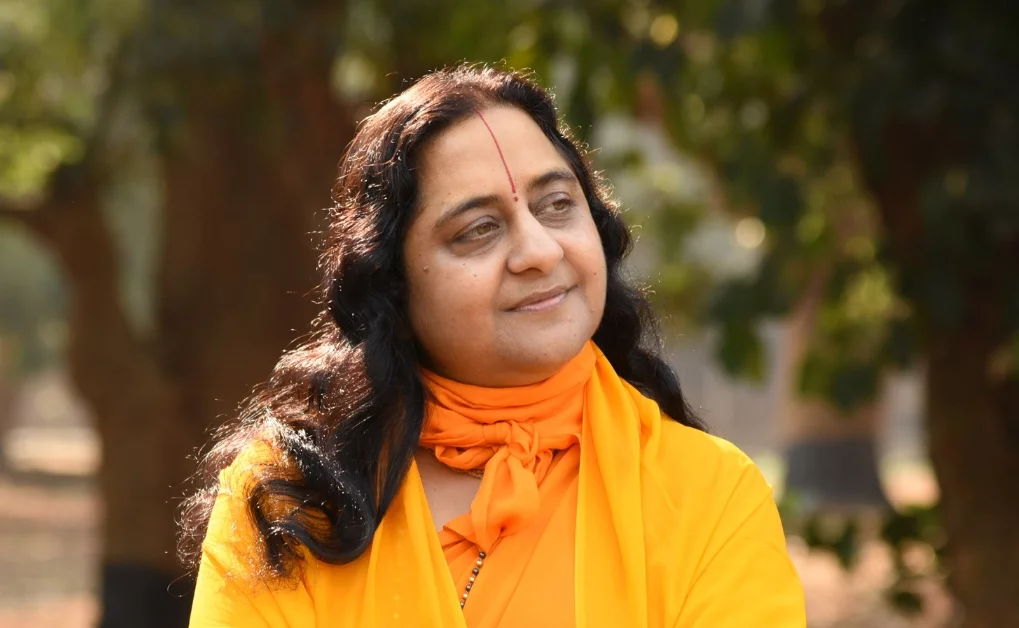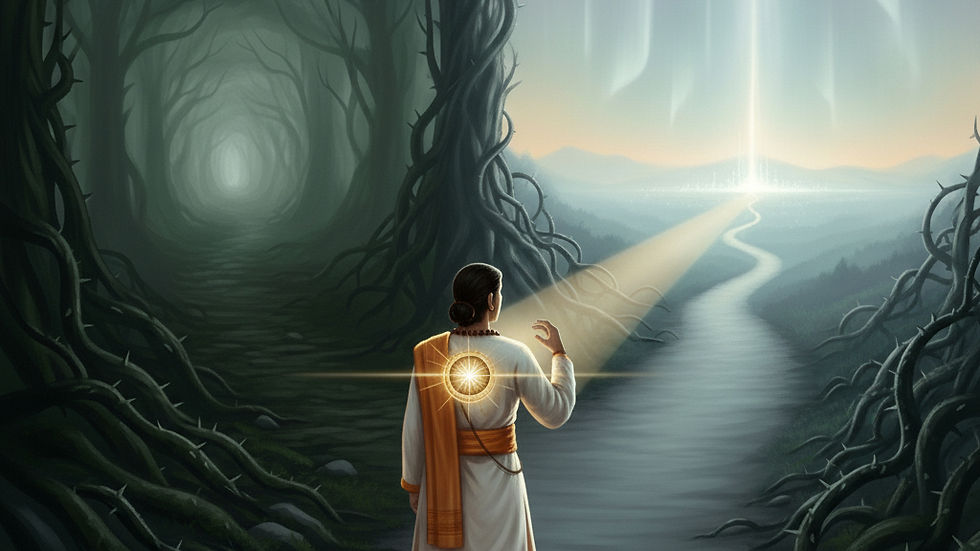Karma, Rebirth, and the Significance of Human Life: A Spiritual Blueprint for Liberation
- H.H. Raseshwari Devi Ji

- Sep 2, 2025
- 4 min read
Updated: Sep 7, 2025

Introduction
In the constant pursuit of worldly accomplishments, we often forget to ask the deeper questions: Why am I here? What is the purpose of this life? What happens after death? These questions are not born of curiosity alone—they are the cries of the soul, longing to understand its journey through lifetimes.
Human life, the rarest and most precious form of existence, is not merely for survival or sensory pleasure. It is a divine opportunity. Through the lens of Karma (action) and Rebirth, we begin to see this life not as a standalone event but as a sacred chance to break free from the endless cycle of birth and death.
In this article, I humbly invite you to explore these eternal truths—truths that awaken the seeker within and lead the soul to its true home.
The Law of Karma: You Reap What You Sow
At the heart of human experience lies the Law of Karma—a law as precise as gravity. Every thought, word, and action sends out a ripple in the ocean of existence, and in time, returns to us. Unlike man-made justice systems, karma is impartial, immediate or delayed, but unfailingly accurate.
There are three types of karma:
Sanchit Karma – The accumulated karma from countless past lives.
Prarabdha Karma – A portion of Sanchit karma destined to bear fruit in this life.
Kriyamana Karma – The karma we are currently creating through free will.
Human life is the only form where Kriyamana Karma can be consciously directed. Animals, plants, or celestial beings cannot earn or burn karma as we can. This makes manushya yoni (human birth) uniquely valuable. It is not a reward but a responsibility.
Rebirth: The Soul’s Unfinished Journey
When the physical body dies, the ātmā (soul) does not perish. It carries with it the impressions of karmas, continuing its journey until liberation (moksha) is attained. This is Rebirth.
Why do some suffer despite doing good?
Why are some born into luxury, others into hardship?
The Bhagavad Gita (4.17) answers:
“Mysterious are the ways of karma.”
The soul may take 84 lakh (8.4 million) species of life, as described in the scriptures. Only the human form allows conscious evolution. And so, if we waste this life in trivial pursuits, we may fall back into the cycle, awaiting another rare chance to evolve.
The Significance of Human Life
Human birth is not meant for mere indulgence. It is the only platform from where liberation becomes possible.
Saints and scriptures declare:
"Durlabham manusham janma tadapi anityam."
– Srimad Bhagavatam 11.9.29
“Human life is rare and temporary. Use it wisely.”
We have the power of discrimination (viveka), the capacity for devotion (bhakti), and the ability to reflect on our choices. This distinguishes us from other life forms.
Why We Must Strive for Liberation Now
Every moment spent in awareness brings us closer to the Self. But procrastination is the biggest thief.
Do not wait for “tomorrow” to start your inner journey. Your next birth is uncertain.
This very life is your chance to:
Break free from ignorance, Offer selfless service and Realize the eternal Self (ātman).
Conclusion
Dear reader, this life is a sacred invitation. The universe has conspired to give you a human body—not to indulge the senses endlessly, but to reclaim your spiritual birthright. Every second is a stepping stone toward freedom or bondage.
Let us not delay the journey. Let us awaken.
“Asato mā sad gamaya, tamaso mā jyotir gamaya, mṛtyor mā amṛtaṃ gamaya.”
— Bṛhadāraṇyaka Upaniṣad 1.3.28
“Lead me from the unreal to the real, from darkness to light, from death to immortality.”
With deep reverence for the seeker within you,
Radhe Radhe,
—Raseshwari Devi Ji
Further Reading:
(Spiritual View: Human Life is the Gateway to Liberation from Misery)
“मानव जीवन और मोक्ष का संबंध: एक आध्यात्मिक समीक्षा” (The Connection Between Human Life and Moksha: A Spiritual Review)
“आध्यात्मिक दृष्टिकोण से मानव जीवन क्यों अनमोल है?” (Why Is Human Life Precious from a Spiritual Perspective?)
“क्या मानव जीवन ही ईश्वर प्राप्ति का मार्ग है?” (Is Human Life the Only Path to God-Realization?)
“मानव जीवन में भक्ति और साधना का स्थान” (Role of Devotion and Sadhana in Human Life)
“कर्म, पुनर्जन्म और मानव जीवन का महत्व” (Karma, Rebirth, and the Significance of Human Life)
Frequently Asked Questions
Q1. Is karma the same as fate?
No. Karma is cause; fate is the effect. Your past karma influences your present, but free will allows you to choose your future.
Q2. Can karma be changed?
Yes. Through devotion, spiritual guidance, and selfless actions, even intense karma can be softened or removed. The grace of a genuine saint accelerates this process.
Q3. Why don’t we remember past lives?
For your emotional and psychological safety. Imagine carrying the memories of hundreds of deaths, betrayals, and losses. Forgetfulness is divine mercy.
Q4. Is suffering always due to bad karma?
Not necessarily. Suffering can also be a divine lesson, a purification, or an opportunity for growth.
Q5. How do I make this life spiritually successful?
By turning inward, serving selflessly, chanting divine names, and keeping the company of saints. These will purify your heart and align your karma with divine will.





















Comments